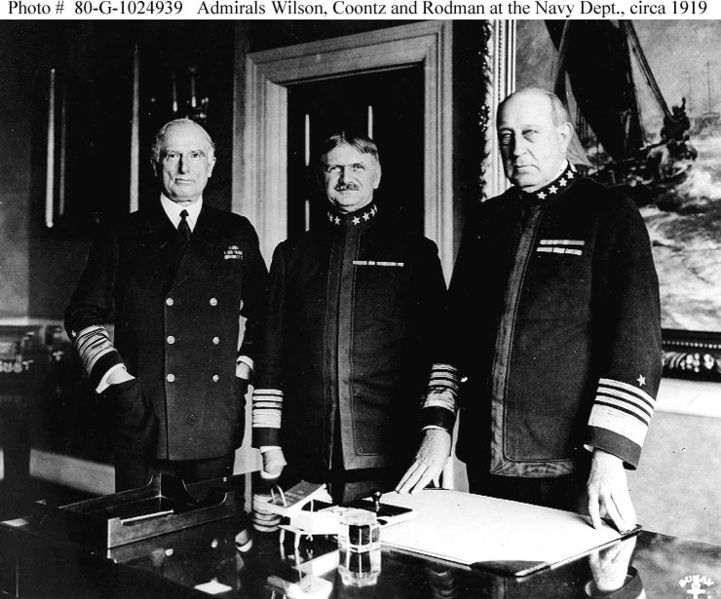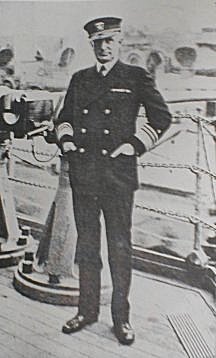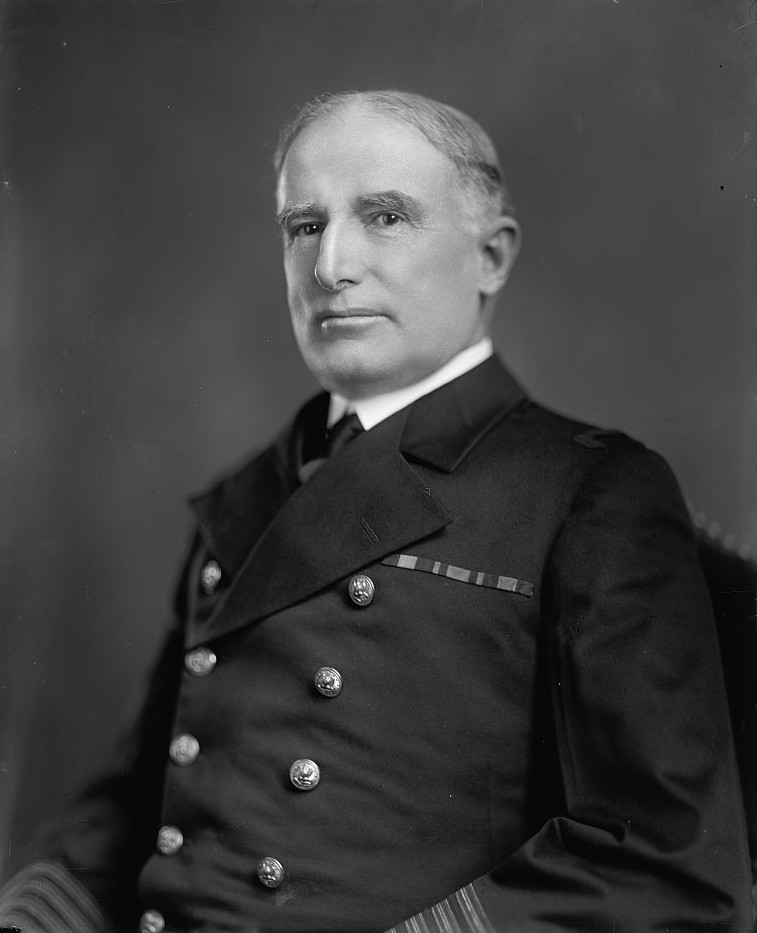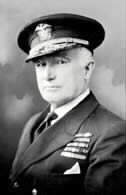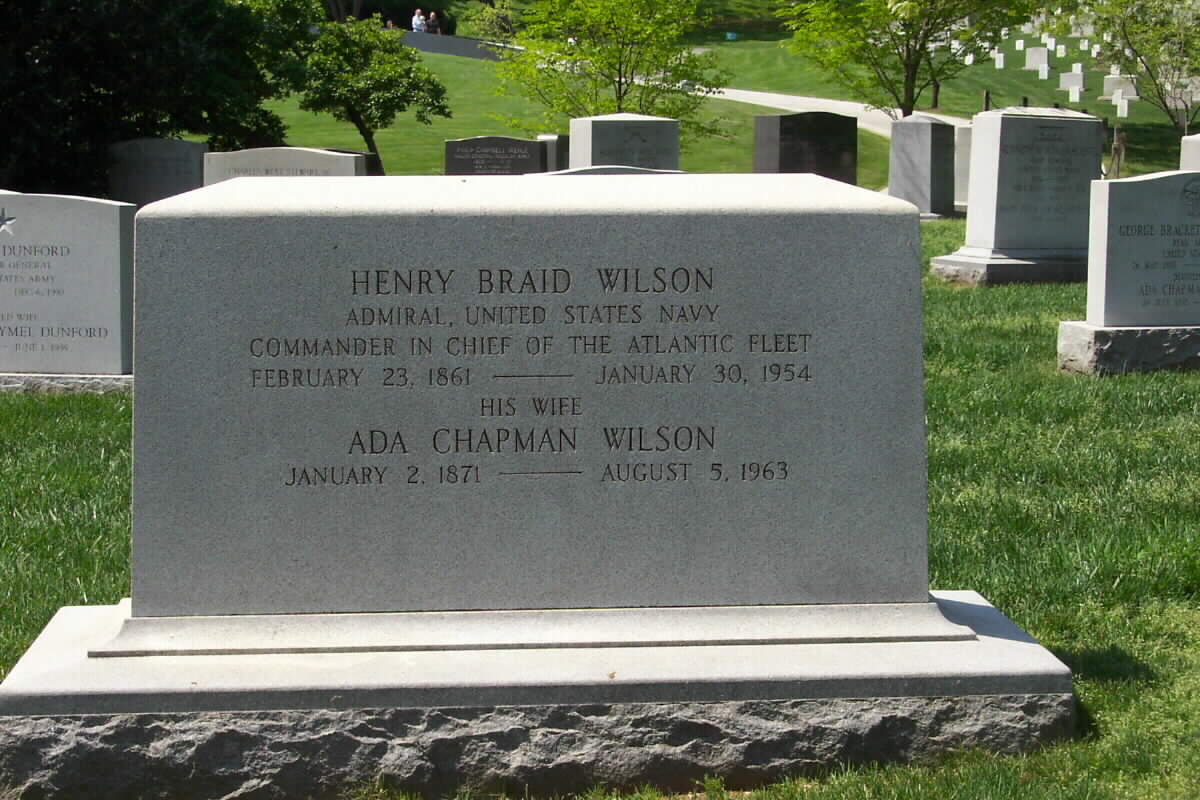World War I naval hero was pride of Camden
Courtesy of the Courier-Post Staff
He was a war hero and one of Camden’s most celebrated natives, but most residents have no idea for whom the city’s busiest thoroughfare was named.
“I’ve often wondered who he was,” said Marsha Yorinks, an English-as-a-second-language teacher at the Rafael Cordero Molina School.
Admiral Henry Braid Wilson – yes, the boulevard was named after him – was born in 1861 on Mount Vernon Street to an influential Camden family. His father, also Henry B. Wilson, was a Camden postmaster, teacher, school board member and legislator.
The school at 9th and Florence streets, which opened in 1908, was named after the father.
The younger Wilson graduated from the U.S. Naval Academy in 1881 and quickly worked his way up the ranks.
He was assigned command of the USS Pennsylvania, the flagship of the Atlantic Fleet, in 1916. The following year in early April, the United States entered World War I and Wilson became commander of the American naval forces in France. He convoyed troops and supplies to France during the war without the loss of a single life.
“He’s on the Camden County calendar,” Molina teacher Ana Carrion said of the admiral’s picture, one of three photos on the calendar’s July page. “But there’s just the picture, it doesn’t say anything about him.”
In 1919, Wilson became commander-in-chief of the Atlantic fleet.
Although Wilson no longer lived in Camden – he spent most of his years in California and New York – his parents still lived here, and he visited often. In April 1919, the city celebrated his return in style – a grand reception, complete with a shad dinner and motorcades.
“It was a Camden officer, in the person of Admiral Wilson, who taught the kaiser ( the main New Jersey highway leading to the Benjamin Franklin Bridge.
Four years later, Wilson returned to Camden as an honored guest once more, this time because city officials had decided to baptize the road “in honor of Camden’s greatest native son.” The change was announced during the 1929 Armistice Day ceremonies.
South Jerseyans soon came to know the highway as Admiral Wilson Boulevard.
What they didn’t know was that name change had not been made official.
During Mayor Winfield Price’s administration, city commissioners tried to correct the problem by adopting a resolution to make the name change official, but an ordinance was needed before the change could take effect.
That ordinance was finally drafted in 1937, according to a Courier-Post article that year, and Bridge Boulevard officially became Admiral Wilson Boulevard.
Wilson died in 1954 at the age of 93. At the time, Camden prospered. But as the city decayed, so did Admiral Wilson Boulevard.
“We always used to say whoever this man was, he must be turning in his grave because of what has become of his boulevard,” Carrion said.
Less than two decades after the war hero’s death, his name would invoke images of run-down properties, violence, prostitution and drug dealing. That’s what motorists saw when traveling on his boulevard for the remainder of the 20th century.
But that changed in 2000, when the national Republican Party decided to hold its convention in Philadelphia.
Led by former Governor Christie Whitman’s desire to clean up the boulevard before the convention, the Delaware River Port Authority spruced up the gritty urban landscape in a hurry with $30 million in bridge tolls. The project was controversial because it displaced a mix of respected and undesirable tax-paying businesses, including a couple of motels, liquor stores, gas stations and Showgirls Palace, a strip joint in Pennsauken near the Camden boundary.
Whitman also authorized the spending of nearly $6.3 million in housing and infrastructure improvement for the area surrounding the road, cleaning up not only the road, but also the admiral’s legacy.
Henry Braid Wilson was born 23 February 1861 at Camden, New Jersey, and graduated from the Naval Academy in 1881.
During the early days of his career he served in Tennessee and Saratoga and on coast survey expeditions to the Bering Sea.
During the Spanish-American war Wilson was attached to gunboat Bancroft and was commended for bravery.
In the years that followed he served in many ships, and was Pennsylvania’s first commanding officer in 1916. He commanded the Atlantic Fleet’s patrol forces during the First World War, and was responsible for the safe convoying of troops and supplies to Europe.
For his outstanding service Wilson was awarded both the Navy and War Department Distinguished Service Medals. Following the war, he was Commander-in-Chief U.S. Atlantic Fleet and later the Battle Fleet commander.
In 1921 Admiral Wilson took over as Superintendent of the Naval Academy, and in his 4 years at Annapolis did much to raise its academic standing and improve the quality of education.
Admiral Wilson retired in 1925 after nearly 50 years of service as seaman, leader, and educator. He died 30 January 1954 at New York City.
Admiral Henry B. Wilson was the most celebrated Camden citizen to contribute to America’s war effort in World War I. Born on Mt. Vernon Street in 1861, the son of Camden postmaster, teacher, and legislator H. B. Wilson, young Henry graduated from the United States Naval Academy at Annapolis in 1881. Wilson worked his way up the ranks, becoming commander of the American fleet in French waters by the First World War. Admiral Wilson convoyed troops and supplies to France during the war without the loss of a single life.
In April 1919, Camden welcomed Admiral Henry B. Wilson to the city with receptions, motorcades, planked shad dinner, and a reception at the Third Regiment Armory. Prosecutor Charles A. Wolverton addressed the banquet gathering. “It was a Camden officer, in the person of Admiral Wilson,” Wolverton told the guests, “who taught the Kaiser and his war lords that there is no such word as ‘impossible’ to be found in all the historic records of the American Navy.””
Source: Camden County, New Jersey, 1616-1976: A Narrative, by Jeffrey M. Dorwart and Philip English Mackey. Camden County, NJ: Camden County Cultural & Heritage Commission, 1976
Admiral Wilson died on 30 January 1954 and was buried with full military honors in Section 5 of Arlington National Cemetery. His wife, Ada Chapman Wilson (2 January 1871-5 August 1963) is buried with him.
WILSON, ADA CHAPMAN WID OF WILSON, HENRY BRAID
- DATE OF BIRTH: 01/02/1871
- DATE OF DEATH: 08/05/1963
- DATE OF INTERMENT: 08/08/1963
- BURIED AT: SECTION 5 SITE 7012 L H
- ARLINGTON NATIONAL CEMETERY
- WIFE OF HB WILSON – ADM U.S.N.
WILSON, HENRY BRAID
ADM USN
- VETERAN SERVICE DATES: Unknown
- DATE OF BIRTH: 02/23/1861
- DATE OF DEATH: 01/30/1954
- DATE OF INTERMENT: 02/02/1954
- BURIED AT: SECTION 5 SITE 7012 RH
- ARLINGTON NATIONAL CEMETERY
Michael Robert Patterson was born in Arlington and is the son of a former officer of the US Army. So it was no wonder that sooner or later his interests drew him to American history and especially to American military history. Many of his articles can be found on renowned portals like the New York Times, Washingtonpost or Wikipedia.
Reviewed by: Michael Howard

